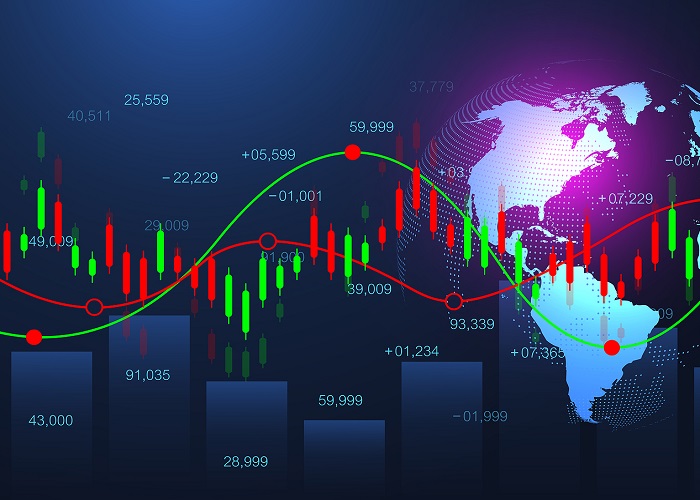The forex market and the stock market constitute two of the most popular financial markets to trade worldwide. This is because of their historical volume, volatility, and the large number of educational resources that are available for traders to take advantage of.
However, it can be difficult to determine what you would like to buy and sell. Trading stocks and forex are both popular with different types of traders. So, depending on your personality type, level of experience, and preferred pace of trades, you may choose one instrument over another. This article will explore the major differences between forex and stock trading, and which one may be more suited to you.
An Overview of Forex and Stocks
The foreign exchange market is the largest and most liquid financial market in the entire world. It boasts a seemingly endless amount of major, minor, and exotic currencypairs for an fx trader to trade with. Forex traders can use pips to monitor any price movements in forex trading to determine whether the market is moving up or down. Some of the popular major currency pairs for forex trading include EUR/USD, GBP/USD, and USD/JPY, to name a few.
On the other hand, stock trading allows traders to speculate on the value of blue-chip stocks and penny stocks, which are both popular trading assets. Some of the most popular shares to trade with come from well-established companies that have large market capitalisation, such as Microsoft, Apple, and Amazon, to name a few.
Difference between forex and stocks
Market trading hours
Trading hours differ between the forex market and the stock market. The forex market is open 24 hours a day, 5 days a week, due to the overlap between various time zones. This is one advantage forex trading has over stock trading. For stock trading, there is a set daily timetable for stock trading hours, which will depend on the specific region and exchange.
For instance, in Asia, stock markets tend to close slightly earlier, usually between 3 pm to 4 pm local time, with an hourly lunch break between 11:30 am and 1:30 pm local time. Stock markets also tend to be closed on weekends. On the whole, forex trading hours are much more flexible than those of the stock market, and there is more time for traders to spend time forex trading.
Volume of assets
Another particular appeal of forex trading is the volume of assets that are available to trade. There are a huge variety of currency pairs, ranging from major, minor, and exotics. Most forex traders tend to lean toward major currencies such as EUR/USD and GBP/USD, as they are generally considered to be stable within the forex market.
While the stock market also has plenty of opportunities for traders to take advantage of, it does not come close to the amount being traded in the forex market. That said, traders can still trade on thousands of global shares within different sectors, such as technology, pharmaceutical, and automobiles. Some of the most distinguished global indices are even traded on the stock market, such as the Dow Jones Index and the S&P 500.
Market influences
Another factor to consider before trading forex or shares is what moves market prices. Primarily, both markets are usually influenced by supply and demand, but there are many different factors that can also move prices.
When trading stocks, traders will need to focus on factors that directly impact their chosen company. This can include things such as the company’s debt levels, cash flow, earnings, economic data, news reports, and sector/industry health.
With forex trading, the focus tends to be wider in scope. This is because a more complex range of factors can impact pricing in the market.Traders need to take the macroeconomics of the country into consideration. This includes unemployment, inflation, gross domestic product (GDP), as well as current events. As forex traders are buying one currency while selling another, they also need to be aware of the performance of not just one economy, but two.
Liquidity
Liquidity refers to the ease at which an asset can be bought or sold in a market. It is an important factor because the higher the volume of traders in a market, the more money there is flowing through the market at any time. This makes it easier for traders to find someone to take the other side of their position.
As the forex market is the most popular and active financial market in the world, it is extremely liquid and frequently sees a daily turnover of trillions of dollars. Market liquidity can also fluctuate throughout the day as different sessions open and close.
The stock market sees comparatively fewer trades per day, but shares are still easy to access and trade. Large popular stocks such as Microsoft, Apple and Facebook are the most liquid as they are usually plenty of buyers and sellers. However, if a trader moves away from blue chips there is often significantly less liquidity.
Volatility
Volatility measures how likely a market’s price will make major, unpredictable price fluctuations. A market with high volatility will see prices change quickly, whereas markets with low volatility tend to have more gradual price changes.
The ease with which forex can be traded makes it very volatile. Although the market usually trades within a small range, the number of trades taking place at one time can cause prices to change extremely rapidly. So, when trading forex it is important that traders keep up to date with current and economic events, as the market is prone to sudden movements in response to these announcements.
The stock market tends to have more stable price patterns that can be tracked over time. That said, there are still periods of volatility. Trade volatility can potentially provide a lot of opportunities for traders, but also comes with increased risk, so traders should take steps to prevent any unnecessary loss.
Leverage
Trading on leverage enables traders to gain exposure to markets with just a fraction of the capital normally required. Leveraged products can be used to trade on margin across a variety of markets. While it can be an advantage of both share and forex trading, it is more commonly featured in currency trading. Forex trades also have a much larger leverage ratio. That said, leverage is a double-edged sword – although it can potentially magnify returns, it can also magnify losses.
Trading strategies
There are also differences between strategies that traders use when trading in the forex market or stock market. Most forex trading strategies aim to make a profit in the short term, such as swing trading, day trading, and scalping. Day trading can also be applied to other markets, such as the stock market, alongside swing trading stocks.
However, focused strategies for stock trading are typically less common. This is because stocks are often traded through long-term positions, and currency pairs are instead appreciated more by short-term traders who thrive in volatile markets. There is also an abundance of resources online on how to forex trade, which is one reason why forex trading is so popular nowadays.
Which one is right for you?
When it comes to picking between forex trading and stock trading, there is no definitive answer because there are benefits and limitations to each market. Ultimately, your decision will come down to your personal preference and attitude towards risk.
When making any financial decisions, it is important to take into consideration your trading style and financial goals. If you are interested in a fast-paced environment, forex trading provides plenty of opportunities for short-term traders. However, if you are looking to take advantage of short to mid-term trends, or want to participate in a less volatile market, stock trading may be the way to go instead.
Related posts
Recent Posts
The Importance of Paint Protection Film for Your Vehicle
When it comes to preserving your vehicle’s pristine condition, one term stands out: Paint Protection Film (PPF). Whether you’re a…
Transform Your Daily Routine: 10 Habits for a Healthier Lifestyle
In our fast-paced world, it’s easy to get caught up in the hustle and bustle, often neglecting our own well-being…



